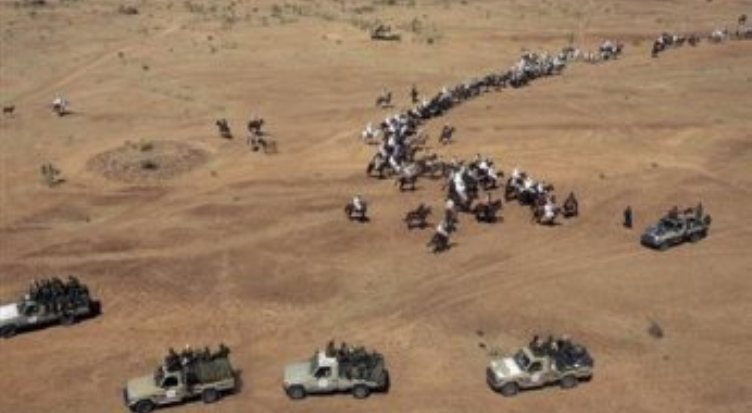Sudan, Ethiopia sign protocol to deploy joint border force

March 12, 2019 (KHARTOUM) – The Sudanese President Omer al-Bashir on Tuesday has called to accelerate the deployment of Ethiopian-Sudanese joint forces on the borders between the two countries.
On Tuesday, al-Bashir met with the Ethiopian Military’s Chief of Staff, Seare Mekonnen, in the presence of Sudanese Army’s Chief of General Staff Kamal Abdel-Marouf.
During the meeting, al-Bashir expressed Sudan’s keenness to promote military cooperation with Ethiopia in light of the challenges facing the region.
He praised the historic and special relations between Sudan and Ethiopia, saying it sets an example for bilateral cooperation on all fields.
The Sudanese President also expressed appreciation for Addis Ababa’s efforts to normalize its relationship with Asmara.
He further expressed his condolences to the victims of the Ethiopian Airlines crash.
In press statements following the meeting, Abdel-Marouf said the meeting discussed economic problems and challenges facing the Horn of Africa particularly those pertaining to cross-border crime, smuggling and human trafficking.
He pointed out that al-Bashir has urged the two sides to expedite the deployment of the joint Sudanese-Ethiopian force on the common border between the two countries.
It is noteworthy that the Ethiopian Military’s Chief of Staff is visiting Sudan to participate in the meeting of the Joint Sudanese-Ethiopian Military Committee (JSEMC).
JOINT BORDER PROTOCOL
Meanwhile, Sudan and Ethiopia on Tuesday have signed a protocol to deploy a joint force to control the border and combat human trafficking and cross-border crime.
The protocol was signed by Abdel-Marouf and Mekonnen at the end of the JSEMC meeting in Khartoum on Tuesday.
In press statements after the signing of the protocol, Abdel-Marouf said experts from both countries would meet after two weeks in Gedaref to determine the force sites ahead of the rainy season.
He said the protocol was signed to maintain border security and stability, pointing out to the experience of the joint Sudanese-Chadian border force.
“This move would allow the two countries to resolve all problems, prevent clashes and maintain the rights of the residents of the border areas,” he said
Although Khartoum and Addis Ababa have close ties, the border area between the two countries remains a source of tension and violence between the two sides due to the human trafficking and smuggling to reach Egypt and Libya.
Also, Ethiopian farmers are accused by the Sudanese farmers of occupying vast agricultural land in the Al-Fashqa area of Gedaref State.
The third issue until recently was Ethiopian rebels who sneak over the border coming from Eritrea. Many have been detained and handed over to the Ethiopian authorities.
Last month, there were media reports that Ethiopia’s Foreign Minister, Workneh Gebeyehu, has warned that Sudan’s failure to curb continued arms smuggling into Ethiopia through its border may lead to cutting diplomatic relations.
However, the Ethiopian government has dismissed these reports as unfounded saying the Foreign Minister’s remarks were taken out of context.
In October 2017, the security committee between Sudan’s Gedaref state and Ethiopia’s Amhara region decided to recommend to the leadership of the two countries to deploy a joint force along the border.
Last August, the Sudanese and Ethiopian armies signed an agreement to withdraw troops from both sides of the border and to deploy joint forces to combat “terrorism”, human trafficking and to eliminate any potential security tensions. But it was not clear if effective steps have been taken towards its deployment.
On the other hand, it is noteworthy that the current borders between Sudan and Ethiopia were drawn by the British and Italian colonisers in 1908. The two governments have agreed in the past to redraw the borders and to promote joint projects between people from both sides for the benefit of local populations.
The joint Sudanese-Ethiopian High Committee announced in December 2013 that it reached an agreement to end disputes between farmers from two sides of the border over the ownership of agricultural land.
In November 2014, the former Ethiopian Prime Minister Hailemariam Desalegn and President al-Bashir instructed their Foreign Ministers to fix a date for resuming the border demarcation. The operation had stopped following the death of Ethiopia’s former premier, Meles Zenawi.
(ST)
